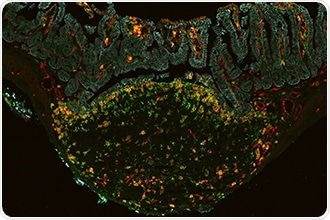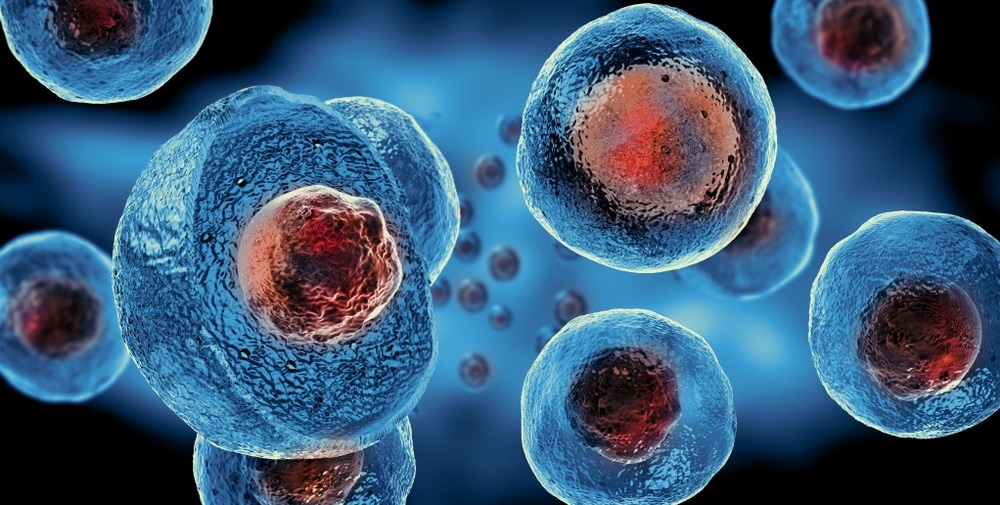With the help of a novel single-cell technique, researchers from the Walter and Eliza Hall Institute (WEHI) have revealed a new way to interpret the programming behind stem cells and how these cells make specific types of cells.

Dendritic cells (co-stained Red/green) in a lymphoid follicle (peyer’s patch) draining the intestine (blue). Image Credit: Wang Cao and Shengbo Zhang.
The study revealed 30 new genes that program stem cells to produce the dendritic cells, which, in turn, initiate the immune response.
The researchers hope that this latest discovery will allow them to identify new immunotherapy treatments for cancer, and they intend to extend this method in other fields as well, such as finding novel drug targets in tumor initiation.
At a glance
- The WEHI team has created a new single-cell approach to interpret the programming that induces stem cells to produce specific cell types.
- The researchers tested the daughters of a single stem cell in different parallel experiments and discovered 500 genes that predicted the fate of dendritic cells.
- Using a CRISPR screen, the team identified 30 primary genes among the 500 ones that program the production of dendritic cells.
- The researchers have planned to extend this method to locate the “big bang’ moment in cancer growth to discover potential drug targets to combat cancer.
 Image Credit: Giovanni Cancemi/Shutterstock.com
Image Credit: Giovanni Cancemi/Shutterstock.com
Studying ‘sister’ cells
The study, headed by Dr. Shalin Naik, Dr. Luyi Tian, Ms. Sara Tomei, and Mr. Jaring Schreuder, and published in the Immunity journal described the processes involved in initiating the production of dendritic cells fueled by the hormone Flt3 ligand, which is employed in immunotherapy.
The researchers devised a new method to correlate the gene expression of a single cell with the types of cells made by it.
We invented a technique called ‘SIS-seq’ in order to study ‘sister’ cells that descended in parallel from the ‘mother’ stem cell. As RNA sequencing destroys the single stem cell, you are only able to measure the genetic contents of the cell but lose the chance to know what it would have made. So, there is no way of then going back in time to find that out.”
Dr Shalin Naik, Walter and Eliza Hall Institute
“By letting a single stem cell divide only a few times, not all the way, we were able to test the sisters separately. Some were tested for what they made, and others were tested for their genetic contents. In this way, we have been able to link the genes with the cell types that are made,” added Dr Naik.
Discovery of 30 new genes
According to Dr. Naik, the results would have not been possible without technological innovations that helped the researchers to answer several questions at the same time.
Using a CRISPR screen, we tested 500 genes that predicted dendritic cell fate and discovered 30 new genes that actually program dendritic cells to be made.”
Dr Shalin Naik, Walter and Eliza Hall Institute
Dr. Naik added that this discovery could lead to new drug targets to combat cancer and boost immunotherapy treatment.
We’ve now got a list of genes to try and generate or boost human dendritic cells in a petri dish for immunotherapy. And we are going to expand the use of this technology to find the genes that program the generation of each of the different human immune cell types.”
Dr Shalin Naik, Walter and Eliza Hall Institute
Finding the ‘big bang’ of cancer initiation
By assessing cells at the single-cell level with the new method, the team hopes to find the “big bang” moment in cancer growth to develop new drug targets and thus combat cancer and enhance immunotherapy.
“Using our time machine technique, we hope to be able to pinpoint which of the normal programs in tissue generation are hijacked by cancer causing genes in single cells and then use this information to find new targets for therapy,” concluded Dr. Naik.
Source:
Journal reference:
Tian, L., et al. (2021) Clonal multi-omics reveals Bcor as a negative regulator of emergency dendritic cell development. Immunity. doi.org/10.1016/j.immuni.2021.03.012.